ЛОКАЛНО И КОСМОПОЛИТНО В ТВОРЧЕСТВОТО НА ДВАМА БАЛКАНСКИ ПИСАТЕЛИ – МАТВЕЙ ВЪЛЕВ И ПАНАИТ ИСТРАТИ
LOCAL AND COSMOPOLITAN IN THE WORKS OF TWO BALKAN WRITERS – MATWEJ WULEW AND PANAIT ISTRATI
Author(s): Ghergana NacevaSubject(s): Comparative Study of Literature, Bulgarian Literature, Romanian Literature, Theory of Literature, Sociology of Literature
Published by: Editura Universităţii din Bucureşti
Keywords: Local; cosmopolitan; Balkan writers; Matwej Wulew; Panait Istrati;
Summary/Abstract: The proposed article is a consecutive attempt to subsume in the discussion for the dialog between balkan literatures. In regime of a dialog are posed two emblematic Balkan writers - Matwej Wulew and Panait Istrati. The article searches analogies between their artistic optics, biographic formants, similarity in their poetics. It searches the common between the toposes that reveal multicultural cities of Bourgas and Braila. The problems and the character systems of two authors describe the strains of local-regional-cosmopolitan. The local colour is distinguished like something exotic, and the crossroading inculturality - like meaning signs and codes. That's exactly the thing which make relative the borders between “yours and somebody else's”, “provincial-cosmopolitan” and indicates a tenacious tendency toward a balkanization and imitation of foreign artistic models. The selected works like “Uncle Angel”, “Kira Kiralina”, “Kodin” (Panait Istrati) and “At anchor”, “A guest from the sea”, “People by the coast”, “Iveresse de l'air”, “Citizens of the world” (Matwej Wulew) illustrate the mixing of folklore, modern mythologies, the popular city culture, the popular love song and so on. Modern writers, P. Istrati and M. Wulew design myths and archetypes, implanted in contemporary subjects and include themselves in a tendency of many european literatures in 20's and 30's of XX-th century. P. Istrati and M. Wulew are strongly impressed by the Levantinian East and the levantinian woman. In the artistic transforming of the character are imposed rooted notions and tough stereotypes but this character materializes the vitalism, hedonism, the love, the freedom. Cosmopolitans on adjustment and sensibility, P. Istrati and M. Wulew show the changed statute of the Balkan man and writer, loyal not to paternalistic homesickness but to the idea for a man like a free citizen of the world.
Journal: Romanoslavica
- Issue Year: XL/2005
- Issue No: 1
- Page Range: 21-27
- Page Count: 7
- Language: Bulgarian

